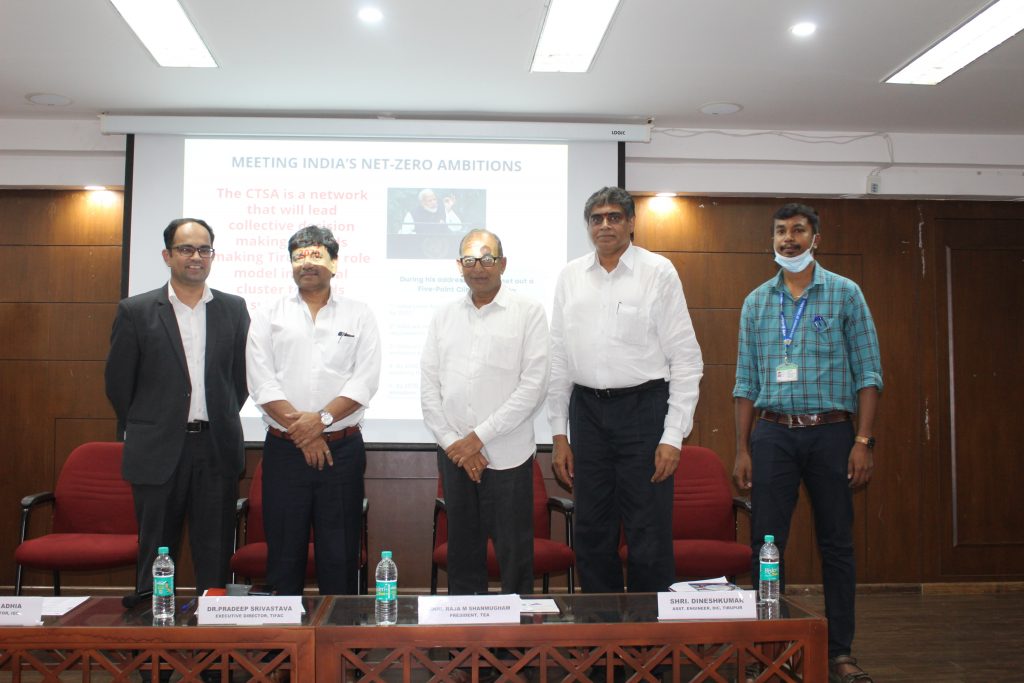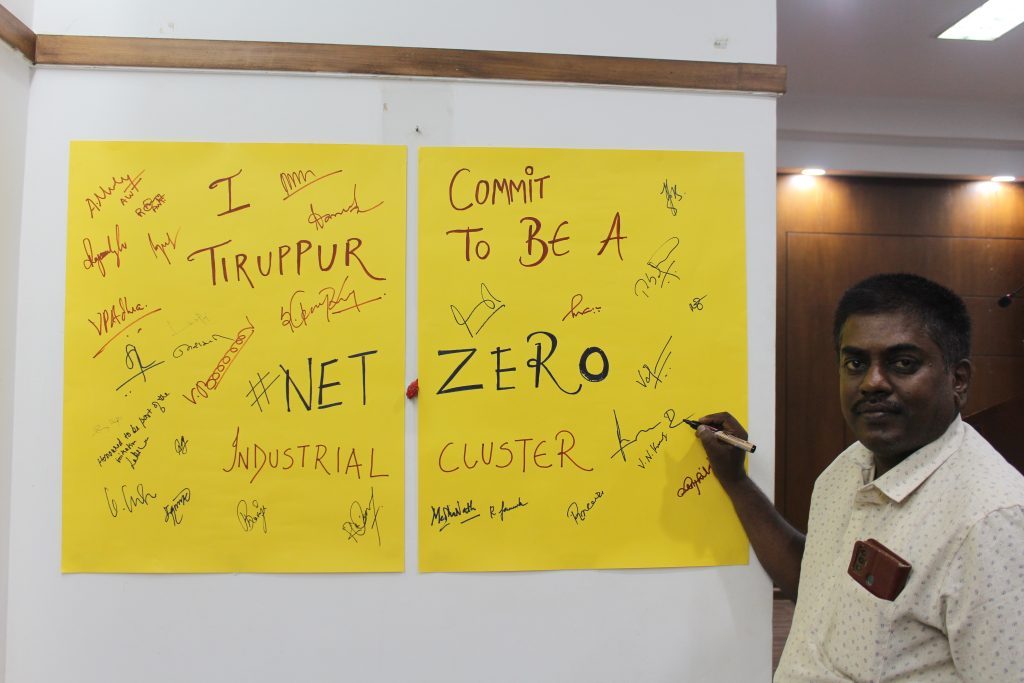
Tiruppur, 25th April, 2022: The Institute for Sustainable Communities (ISC) and the Technology Information, Forecasting, and Assessment Council (TIFAC) collaborated to host a technical workshop titled "Accelerating Clean Equitable Manufacturing in the Tiruppur Industrial Cluster" to start discussions about how to promote low-carbon operations in Tirupur's textile manufacturing industry. The event offered a forum for the sharing of ideas and the formation of strategic alliances between major organizations, both public and private, clean technology suppliers, SME owners, and other local leaders, including local funders and scheme providers. The establishment of the Cleantech Steering Alliance (CTSA), a network of local leaders who will guide collective decision-making toward creating Tiruppur a role model industrial cluster for sustainable manufacturing and low-carbon operations, was the focus of the event. Local leaders who were recognised by ISC to be a member of the CTSA were honored with awards, proclaiming them India's net-zero by 2070 champions. The workshop participants included industrial organizations, MSME owners, cleantech innovators, financial institutions, and scheme providers who all pledged to work together to reduce Tirupuur's carbon and environmental impact.
The workshop's panel featured a number of key stakeholders, and Mr. Vivek Adhia, ISC's country director, kicked off the discussion by emphasizing the need for a coordinated approach to sustainable manufacturing, with contributions from government organizations, local leaders, implementers, funding bodies, and clean technology providers. TIFAC's Executive Director, Dr. Pradeep Srivastava, made a powerful opening statement, urging for efforts to make Tiruppur India's first net-zero carbon emissions industrial cluster. Mr. Raja M. Shanmugam, President, Tiruppur Exporter’s Association (TEA), and Mr. M. Dinesh Kumar, representing the District Innovation Center (DIC) Tiruppur, delivered special remarks at the panel. Mr. Shanmugam stated in his speech that the Tiruppur textile cluster has the potential to transition to clean technology by stating that the cluster is already conducive to clean technology and sustainability, with an installed renewable energy capacity of 8 times total consumption and initiatives such as zero liquid discharge already underway. In addition, Ms. Lakshmi Murugesan, speaking on behalf of the Small Industries Development Bank of India (SIDBI), underlined SIDBI's desire to assist Tiruppur's cleantech transformation through green and sustainable finance, which is consistent with SIDBI's vision and goal.

Three clean technology entrepreneurs presented their innovative ideas for low-carbon operations in Tiruppur's textile cluster during the workshop. The clean technology demonstration session featured waste heat recovery technology from Promethean Energy, solar energy solutions from Hi-Tech Solar, and high efficiency boiler technology from Thermax. The promise of these technologies for Tiruppur's clean and sustainable manufacturing piqued SME owners' attention, resulting in the formation of much-needed vendor-buyer networks. Following that, Mr. Panaliswamy, president of Rotary Screen Printer’s Association (ROSPA), and Mr. B. A Mudheshwaran, Treasurer of Dyer’s Association of Tiruppur (DAT), had an open house discussion on the need of collective action in transitioning to sustainable operations. Mr. Panaliswamy stressed that "sustainability is not just a viable business model worth pursuing, but it also supports climate positive action".
The workshop was a success and provided a platform for the establishment of a network among Tiruppur's local leaders and helped to simplify Tiruppur's net zero intention and future action. By connecting SME owners with clean technology suppliers and financiers, the event was able to complete the loop on promoting rapid action for implementing clean technology solutions in the textile sectors. Mr. Mukesh Mathur, TIFAC, correctly said that the Tiruppur textile cluster is already ahead of its peers when it comes to sustainable operations during his lecture on TIFAC's participation in technology gap analysis and other interventions for Tiruppur. It serves as a model for other textile clusters in India in terms of production quantity and quality, technical improvements, and policy awareness. Going ahead, the goal of ISC and TIFAC's combined project is to make Tiruppur's textile cluster a worldwide role model for low-carbon manufacturing operations, not merely a national benchmark. Tiruppur's textile cluster should be elevated from a national standard to a worldwide net-zero champion in the manufacturing sector, according to the leaders and changemakers. The workshop came to a close with a networking session, which allowed for casual discussions and strengthened strategic ties between the panelists, attendees, and hosts.
*Disclamier: "The pages slugged ‘Press Release’ are equivalent to advertisements and are not written and produced by Industry Outreach Magazine journalists/Editorial." We do not hold any copyrights towards the content or image. Image source: Newswire







